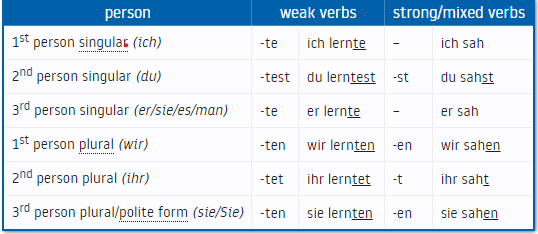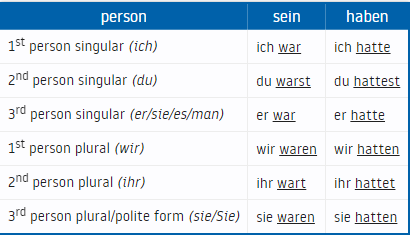Imperfekt – Past Tense in German Grammar

The past tense In German, also called simple past or imperfect (Imperfekt or Präteritum in German), is used to express facts and actions that started and ended in the past. It is typically used to tell stories or report past events in written German. In spoken language, it is common to use the perfect tense instead of the past tense. We can use the English simple past to translate this tense.
Master German tenses online with Learn German online grammar explanations and exercises. Learn what the past tense is, when to use it and how to conjugate weak (regular), strong and mixed (irregular) verbs.
Past Tense in German Grammar
It is also called simple past or imperfect (Imperfekt or Präteritum in German), is used to express facts and actions that started and ended in the past. It is typically used to tell stories or report past events in written German. In spoken language, it is common to use the perfect tense instead of the past tense. We can use the English simple past to translate this tense.
Example

Usage
There are two ways to use the past tense in German, we can use it to express:
- a completed action in the past
Example: Im letzten Jahr machte ich Urlaub in Deutschland.
- a fact or condition in the past
Example: Die Strecke war fantastisch und ich hatte tolles Wetter.

Conjugation of German Verbs in Past Tense
To conjugate verbs in the simple past, we remove the infinitive ending -en and add the following endings:

The verbs sein/haben are irregular. They are especially important in the simple past:

Exceptions
- Many strong/mixed (irregular) verbs change the word stem in the simple past. (see list of strong and mixed verbs)
Example: gehen – ging, bringen – brachte
- If the word stem of a strong verb ends in s/ß/z, we either leave off the ending s, or we add an extra e.
Example: lesen – las – du last/du lasest
- If the word stem ends in d/t, we add an e before the ending for endings that begin with t/st.
Example: landen – ich landete, du landetest, er landete, wir landeten, …
bitten – ich bat, du batest, …, ihr batet
- If the word stem of a strong verb ends in ie, there is no ending e in the 1st/3rd person plural.
Example: schreien – wir/sie schrien (not: schrieen)
At last, you can improve your German with Learning German App.



























